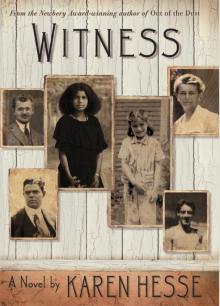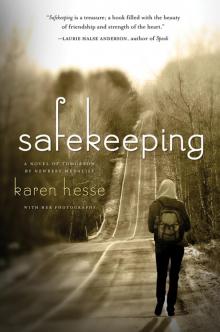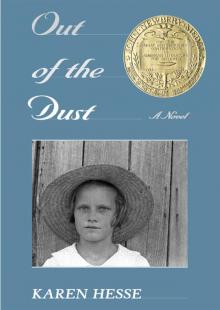- Home
- Karen Hesse
Safekeeping Page 2
Safekeeping Read online
Page 2
I imagine myself walking the thin red line of Route 101 from Bedford to Keene, then Keene to Brattleboro, and finally walking down Putney Road to my front door.
It’s too far.
Stop it, I tell myself.
But it’s too far.
Maybe you’ll get a ride. Mom and Dad could show up at any moment. But even if Monsieur Bellamy doesn’t get through to them, maybe someone will recognize you from home. Quit making it out to be the end of the world. You’ll get there. Everything will be okay.
Footsteps sound somewhere behind me and I realize how vulnerable I am, isolating myself on this narrow path. I’m afraid to turn and look at the person approaching.
Kneeling, I get a good hold on my backpack, trying to act nonchalant. I think I can spin around and stun someone with it if I have to.
While I pretend to be getting something out of my pack, the footsteps come right up on me. Then a man and his dog blow past. They don’t even acknowledge me.
I rise, brush the grass and dirt off my pants, return to the road.
In my head, I am spinning a lie about who I am and what I’m doing. It would be easier to tell the truth. Dad would advise me to tell the truth. But I remember that last officer in customs and how he reacted to my name and I’m afraid to tell the truth.
* * *
I can smell food before I see the restaurant entrance. I’m mad crazy hungry now. How long has it been since I’ve had anything in my mouth but gum? If only I had a little emergency money left. My parents sent me with plenty of cash. But I spent it all. I’ve never been good at holding on to money. All I have is the fifty cents I stole from the couple at the airport.
I hadn’t thought about how I’d eat when I gave Monsieur Bellamy the money for the plane ticket. Or where I’d sleep. I just assumed my parents …
Until I went to Haiti, I’d never gone for more than a few waking hours without food. Then, at the orphanage, I learned to get by on one meal a day … just like the children … just like Therese, the laundress, and Eulalie, the nurse.
It was hard at first.
At home I lost my temper when I got too hungry. My mother always carried snacks in her purse so I wouldn’t turn mean. In Haiti, I just barely managed to be civil at first on an empty stomach. But in time my body got used to it.
I don’t know how long a person can go without eating. One of the orphans, Delphine, a small girl with dark, thoughtful eyes, was pulled from the rubble on the sixth day after the earthquake. Six days buried under the wreckage of a building with no food or water. If she could survive that, I can do this.
At least I can cup my hands under the faucets of gas station sinks and drink. Delphine couldn’t do that.
I stand outside the restaurant. There are only a few cars in the parking lot. My stomach is red-hot with hunger.
The day is starting to fade and I notice there are no lights going on.
Entering the dim restaurant, I ask if they’ve got any food they were going to throw away. The waitress glares at me, disgusted. She yells at me to get out.
My heart is pounding and I can’t see straight as I stumble back into the parking lot. People have always been so kind to me. Given me things, even before I asked for them.
I’m halfway across the lot when a girl about my age catches up with me. “Look,” she says. “Linda isn’t usually like that. I don’t know. Everything’s so crazy right now. It’s just there’ve been so many people begging. There’s a Weathervane a few miles down the road,” she says. “My brother works there. He’ll help you … give you something to eat. They’ve got a generator running full-time there. They’ll be open right up to curfew. My brother says they’re throwing tons of food away. Just don’t get caught out after curfew, okay.” Then, embarrassed, she hands me a soiled napkin with something wrapped inside and veers away.
I hold the napkin carefully. If it’s still a few miles to the Weathervane, I can’t walk fast enough to beat curfew. Whatever is inside the napkin will have to do for tonight.
Unwrapping the bundle with shaking hands, I find the crusts from three slices of pizza. It’s more than I could have hoped for. I silently thank the girl.
While gratefully gnawing my way through the first two crusts, I manage another mile or so. As dusk cloaks the road in shadow, I slip into the woods behind the Hill Brook Hotel.
All day the sky has threatened but not until I’m in under the trees does a light rain begin to fall.
As I sit on the edge of the woods, chewing the last crust of pizza, listening to the tap of rain on new leaves, it dawns on me how long this night will be. I know I shouldn’t take it out and expose it to the weather, but I ignore common sense and slip my hand into the zippered compartment where Jethro stashed his little bear.
I didn’t know how soft it was. I wonder if all the knitted dolls my mother makes for the orphans are this soft. I hold the bear against my cheek, press it against my closed lids, take comfort from it, before tucking it safely away in my backpack again.
By now the rain has penetrated through the leaf cover, soaking me to the skin. It’s not even midnight, I think, and I’m dripping wet. And I’m cold.
And I’m scared.
And I’ve never been so alone, not in all my life.
I think about the children at Paradis des Enfants, how they wanted to come and sleep in my bed with me and I didn’t let them. How their little bodies, all elbows and ribs, pressed against me as I sat on the edge of their cots and wished them good night.
I long for them now. For the smell of them, for the feel of them leaning into me.
I’m so exhausted; my legs burn from walking, my stomach burns from hunger. But my brain won’t shut down.
* * *
The night is endless. I think and think. About my mom and dad, about my room at home, about Chloe and Janine, about Romulus, about teachers at school, and the children at Paradis des Enfants.
I play over and over my conversation last Friday with Monsieur Bellamy. He swore to me that it was impossible to get a ticket back to the U.S.
“But my parents…”
“They are adults. They can care for themselves. You are safer here right now.”
“But I’m needed there.”
“You are needed here, Radley. Everyone abandons these children. Do not turn your back on them.”
“You can’t keep me here, Monsieur Bellamy. I’m a volunteer. If I want to go home I should be allowed to go.”
It took all the money I had, leaving only a few coins for Eulalie to buy bread for the children when they complained of their stomachs aching.
I told Monsieur Bellamy that I hadn’t been able to reach my parents to tell them I was coming. I told him at least three times.
He looked so sad. “It is very difficult in America now. If it is too dangerous, you must go to Canada. Do you hear me, Radley?”
Was that yesterday morning? Could that possibly be only a day and a half ago?
Haiti seems like a dream now as I shiver inside the woods somewhere between Manchester, New Hampshire, and home.
I remember how the children followed me to the gate of the orphanage. It was hard to leave them.
When the gate swung shut behind me, separating us, I heard them weeping in the yard. I heard the sound of them over the concrete wall.
And then Jethro began to sing.
I sit in these woods in New Hampshire remembering the sound of Jethro’s voice following me down the road. I slip my finger into the half-zippered compartment of my backpack and touch the small, damp bear, and I am filled with an indescribable sorrow.
* * *
I steal out of the woods at dawn. After walking yesterday in neighborhoods, the road today feels so desolate and empty. The rain has stopped but I’m wet from sitting all night in it and I’m stiff and sore from yesterday’s march. And I’m tired. My eyelids feel like they’re lined with sandpaper. And now black flies have started swarming around my head.
After less than an hour I
come on a small food market. Inside, I use the restroom to wash up. The power seems to have come back on again.
I think about asking for food but I can’t bring myself to do it, not after the waitress yesterday. I’ll have to get to the Weathervane. It can’t be much farther.
But once I do get there I don’t know what to do. It’s too early in the morning for anyone to be there yet. There are no cars in the parking lot. The restaurant isn’t opened and won’t be for hours.
I retrace my steps back to the road and start walking again.
Except for the occasional cluster of retail stores, I’m surrounded by forest. The road is an endless conduit for camo-colored military vehicles, long lines of them.
I force myself to act like a kid walking to school. There are a couple of us out here on foot with packs on our backs so I’m not as unique as I feared.
I order my aching, exhausted body to go on.
A few pizza crusts and a pack of gum. I had more to eat in Haiti.
Each vehicle that approaches, either from the east or west, I check for the green plates of Vermont, hoping someone I know is behind the wheel.
When I stop to rest throughout the day, my legs tremble stupidly. I think, at least my shoes fit, remembering how careful Mom was. Making certain the boots didn’t rub. Insisting I wear them around the house for a few days before packing them to go to Haiti.
By the time I stop for the second day, I’m hollow as a bone and my head throbs. I want food. I want a shower. I want a flush toilet. I smell bad and I feel worse. More than anything I want my parents. I have tried every pay phone along the road but there aren’t many and even fewer that work. The last time I tried, I got a new message. This number is temporarily out of service. I’m hoping whatever is messing with the phone lines will be repaired by tomorrow and I can call home. My parents could be here in less than two hours, assuming they’ve got the papers they need to cross state lines.
I prepare for another night in the dense, damp, cold woods, wedging myself against a tree. Pulling my knees up, I rest my chin on my bony kneecaps and scratch my bug bites. I unzip the bear and press him against my stomach. Keeping pressure there helps to ease the hunger. I think about my bed in Haiti. I think about rice and beans and bathing babies in sun-warmed rainwater. I have to be smarter about this. Tomorrow I have to spend the night under some sort of shelter if my parents don’t find me. Tomorrow I have to eat.
Eventually I nod off.
Sometime during the night I wake, fully alert. I hear footsteps running along the gravel shoulder. It sounds like someone moving fast. There is the quiet hum of a motor, as if someone is driving slowly behind the runner. Then the motor cuts out, doors slam, and I hear multiple sets of feet pounding the ground.
Almost as quickly as a scream begins, it’s silenced. There is only the sound of fists against flesh.
After the car peels away, I think I should get up, leave my hiding place, check on the person by the side of the road. But somehow I can’t make myself leave the safety of the woods. And I cannot stop trembling.
* * *
I am so cautious when I emerge from the trees at dawn, but there is no one lying on the shoulder and no one waiting for a new victim. Whatever happened during the night belongs to the night.
I feel grateful the fists didn’t find me, and then hate myself for feeling that way.
This is my third day on the road and in that time I have had water to drink and gum to chew, three crusts of pizza, and nothing more.
I don’t know how far I’ve gone; it’s just one step after another. I’ve stopped swatting at the flies. It takes too much energy. I let them swarm. I let them bite. And I keep going until I see a woman sitting in a car on the shoulder of the road.
She’s eating a sandwich, staring out her front windshield.
My feet won’t go on. I can’t take my eyes off her sandwich.
She sees me.
I am having trouble standing. The ground moves beneath me.
The woman leans out of her car window.
“What are you staring at?” She wipes a smear of mustard from the side of her mouth with the tip of her index finger. I watch how her hand moves, how her sandwich moves. I watch everything that has to do with that sandwich. “Quit staring at me,” the woman yells.
“Hungry,” I say. “I’m … hungry.”
She squints, holding the last bites of sandwich in her hand. She motions me over to the car. She is not kind, I can see that in her eyes, I can hear it in her voice.
I am afraid to come close to her but I am too hungry not to come. I venture only so far and reach out my hand but there is still a space between us. My hand is shaking.
“Here,” she says, thrusting what’s left of her sandwich out the window, tossing it toward me.
My reactions are slow. The sandwich, what’s left of it, lands in the road. I stare at it.
“I thought you were close enough,” she says. There is nothing nasty in her voice now.
Trembling, I bend down and pick up what’s left of the sandwich, bread crusts, a sliver of meat, a drop of mustard.
Road dirt and all, I shove it into my mouth, stumbling back across the road away from her.
After a couple of miles, I veer off 101, cutting a small corner from my journey and come through the town of Milford.
I smell food again.
Not long after a restaurant comes into view. But I am afraid to go in. Something makes me hold on to my fifty cents. Something keeps me from walking through the door and begging.
I slip around the back of the restaurant instead. In the middle of the day, cautiously, I edge up to the Dumpster. As silently as I am able, I lift the lid and grope inside, pulling out the first plastic bag that comes to hand.
I thought this would be harder. I look around to see if anyone is watching, rip the plastic open, shove food into my mouth. While I’m chewing I fill my pockets with food. The Dumpster stinks. It makes my stomach rise.
I throw the ripped bag back into the Dumpster, lower the lid, look around again, and though my heart is racing, I walk coolly away from this thing I have done.
Ten minutes down the road I duck into a small grove of trees and throw up everything I’ve eaten.
No sooner does the heaving stop, I reach into my right pocket and, a little more slowly this time, begin to eat. French fries, cold, stained red with ketchup. Few things have ever tasted this good. I eat three. Then two more. I’m eating more slowly now, walking more evenly.
I watch eagerly for the next Dumpster.
* * *
By the time I reach the village of Marlborough I start recognizing certain landmarks.
There’s a used bookstore here. They carry every subject you could possibly imagine, including photography books, even some of my mother’s. She’s crazy about the place. We drive over here once a year, sometimes more. It takes less than an hour by car to get here from home.
I walk past the bookstore now, glancing toward the shelves of paperbacks on the porch.
The shelves are still there, the books are still there. But the shop looks abandoned.
A radio plays in the mini-mart where I use the bathroom. Instead of music, they have a news station tuned in. Stories include a shooting at a Claremont grocery store, a sniper picking off National Guardsmen in Concord, a body found in the Ashuelot River.
The girl at the mini-mart eyes me suspiciously as I hover in an aisle, listening.
A rack of newspapers stand at the door. One of the headlines reads: MAN CAPTURED CROSSING STATE LINES.
I hold out my fifty cents and will my hand not to tremble. “You got any food I could buy for this?”
She points to a display of plastic-wrapped sweets, two for a dollar. I study them. Then shake my head no and leave the store.
I’ve already raided her Dumpster, stowing my take in my backpack. She can keep her plastic candy. I can keep my fifty cents.
* * *
When the commercial stretch of Keene com
es into view I know I’m close.
I’m tired, I reek. Though I wash up in gas stations and mini-marts and fast-food places, I still look pretty road worn.
I have a ridiculous sense of pride at having made it this far. My parents will love this story once they get over the shock.
I keep walking despite the approach of night, hiding when I hear a car coming. It’s just so hard to stop now.
I long to be settled in my own home, sitting across the table from my parents, talking about everything that’s happened over the last few weeks in their world, in mine.
But I’d never make it the whole way in the dark along this stretch without being arrested for breaking curfew or attacked by thugs.
I hate stopping when I’m this close but it’s insane to go on.
Taking shelter away from the yards of barking dogs, away from curious eyes, away from the knots of vigilantes trolling this section of Route 9, I wait out the night.
* * *
In the early hours of the morning I begin the final leg of my journey.
By afternoon, there is one long hill remaining between me and Vermont, between me and Brattleboro. One long hill cut eons ago by the Connecticut River. But I can’t cross state lines without the proper papers. Instead, I step off the road into a wooded stretch of land and wait for dark. Jethro’s bear waits with me through the hobbled hours.
Around two in the morning I zip the bear back into his pocket, and cautiously, my heart drumming in the hollow of my throat, I approach the bridge over the Connecticut River.
There is a guard booth on the New Hampshire side. But it’s empty.
I crawl over the pedestrian bridge, the old bridge over the Connecticut, expecting a bullet biting into my flesh at any moment. But I am halfway across, then all the way across. And no one, nothing has stopped me.
As I emerge from under the railroad bridge on the Vermont side of the river and edge through the darkness, onto Putney Road, joy overtakes the fear. I am almost home.

 Witness
Witness Safekeeping
Safekeeping Sable
Sable Out of the Dust
Out of the Dust Letters From Rifka
Letters From Rifka The Music of Dolphins
The Music of Dolphins Wish on a Unicorn
Wish on a Unicorn A Light in the Storm
A Light in the Storm